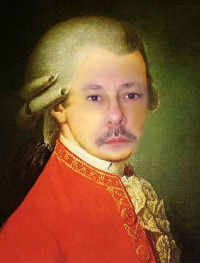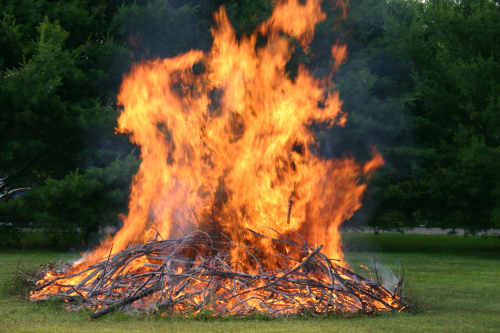A 365-Day Project
"We Are All Mozart"
A project to create
new works and change
the perception of the
music of our time.


 July 10, 2006
July 10, 2006 
Yesterday there was a family cookout, the perfect example of heartland Amerca, even though this is Vermont. Dogs, burgers, mac & cheese, fresh garden salad, healthy juices, local beer, and kids & babies everywhere, on swings and in tents and down slides. And there was a huge bonfire after dinner, and a full moon rising.
The heartlandiest element was, of course, the music -- the CD player in shuffle mode. Celtic bands, Aerosmith, the Eagles, Enya, Rush, some knockoff of Alanis Morissette. No hiphop, no Bjork, not even some Jane Siberry or Staind, and certainly no Diamanda Galas. No, it wasn't a Diamanda kind of cookout.
But it brought me back to a 2002 trip to the west coast of Ireland and an experience that gave me pause about the viability of nonpop -- brief pause, but a heart flutter nonetheless.
My knowledge of Irish music is fairly superficial -- the forms and tunings, and some of the more well-known performers are in my collection: early Chieftans, Planxty, Alan Stivell, and the faux-Celtic Dead Can Dance, plus the few years I spent listening to a well-produced local radio program, and some formal study so I could teach an elementary school unit. Just enough, I thought, to listen to Irish music in its native land without feeling ignorant.
I was wrong. Nothing quite prepared me for the live 'session,' as it is modestly called, at a small pub called Teach Hudi Beags in the town of Bun Beg in Northwest Donegal.
These sessions occupy a peculiar ground between replication and improvisation, where improvisation moves inexorably toward a kind of communal perfection. Not only do the musicians share a deep body of repertoire, but they learn from and teach each other as the session moves forward. The pennywhistle was traded to a fiddler, who learned the older fiddler's tune as it progressed. It wasn't a hit-and-miss learning, however: Instead, it began as a sustained-tone embellished pedal and grew into a slight counterpoint and finally, once he had learned it, into a parallel of the tune at the octave.
The events of the evening tumbled one after another, all revealing as the light from a bonfire. The first was the open invitation to play in a session -- in a sense, every such session is open, but these sessions are not open-mic night. They carry expectations.
A few songs into the evening, a slender man with a handsome 12-string guitar slipped into the pub and sat quietly just outside the session circle, a few songs later beginning his participation by strumming and fingering the standard chord changes. The sound of the 12-string was as bright as it was new, just a touch out of character with the well-worn instruments in the group.
Then one of the regulars said, "Give us a song!" And rather than yield to the experience of the others -- which in retrospect might have been the proper response -- he obliged with a long and tiresome rendition sung in a pinched, nasal voice with the studied, affected, and painful expression of an amateur folk singer with more ambition than talent. The group listened to his entire effort, though without seriously cloaking their feelings. The pub applauded mildly, but no place was made for him within the circle. During a quiet and sensitive song the 12-string grated, and the guitarist put a hand on his shoulder that stopped his playing. He did stop, and soon backed quietly away from the group, packed his shining 12-string, and left in soundless shame. It was a painful demonstration of expectations in the presence of genius, for one of the fiddlers that night was the legendary Francie Mooney.
By contrast, a woman moved into the circle and picked up the fiddle abandoned briefly by a player gone off elsewhere in the pub. When she began to play with the group, the ensemble came together very tightly around her sound. She played just one song, and the old fiddler Mooney said quietly, "We missed you."
The abandoned fiddle was a story in itself. The publican turned out to be quite the fiddler, and alternated playing in the session with serving at the bar and busing tables. Stevie thought he carried a pained, haunted look, even more deeply visible while he was playing.
Next to us, a table of five young women sang quietly with one of the songs. The musicians heard them and called for them to sing up, and the girls gigglingly selected one at their table to sing. Her voice -- light, low and untrained -- was lovely, and the players brought her into their tuning very subtly, within a few bars of the unaccompanied start. The tune was Curtains of Night or Banks of the Old Pontchartrain, as I recall, but I don't remember the words as American. Later she sang another, as did a table-mate, though less successfully.
Each of the players had the chance to begin a song or two, and the others would join in after a single phrase. It was a study in conversation and communication between and among players, equal to the finest jazz playing I have heard, but without the solo improvisatory breaks. The improvisation appears more as subtle embellishment on a strict, formal, and well-known (largely) dance form, with the emphasis on a play of sound rather than compositional innovation -- much like the play of light in a still-life, where its level of painterly detail grows infinitely with the curve of a camel's hair. Whatever the light, though, the masterpiece remains unchanged over time.
We travelers did not say much, and came into the evening and back out of it with different perceptions. Our guide, a Dutchman well-versed in Irish music, knew that it was a wonderful session; that much was clear to all of us, but he didn't articulate why that was so. To Stevie, it had the liveness of a tradition of joyous statement not simply against adversity, but joy and sadness borne out of the life that included (and still includes) struggle -- to survive individually, as a political entity, as a people, and in language, and a culture under constant erosion from internationalism.
For me, it was much of that societal context, but more of a musical one, as a composer and technician. I don't cry or exult with it because it is, at heart, counter to growth in my own artform, as much an immobile artistic object as the dead European white men are in front of my own work. Perhaps the strength of the tradition explains why Ireland has offered few original concert music composers in the past two centuries; or perhaps it is only the weather.
In my own terms of technique and development, though, especially the slow-moving linear changes of which I am so fond, there was so much to discover. To realize, for example, that the 80-year-old Donegal fiddler (and father of singer Mairéad Ní Mhaonaigh) Francie Mooney -- whose birthday was being celebrated that night -- was emulating the temperament of the pipes was at first disquieting and soon stunning. Mooney was also a study in the glacial but inevitable change of traditional musics like Ireland, the Balkans, East Africa, and Java, or even the "tradition" of incessant re-interpretation of the same Bach preludes and fugues. His playing technique was characteristic Donegal (I am told by our Dutch friends), and I watched his motionless body, strong bowing arm, barely moving fingers, and collapsed wrist play dramatic and rich sequences of notes, framed in lovely, liquid timbres and characterized by fleeting shifts of melodic ornament.
I mused over whether that wealth of experience could be distilled into not what was the same from playing to playing, but what was unique, what gave it his sound, his embellishment. But ultimately I had to dismiss the idea, because this music is not about difference, it is about long-standing community, deep and broad enough that both the Dutchman and the table of Irish tourist girls from somewhere else in the country could all sing along with the very same songs, at least one of them from America.
Our friend once asked, "What's the matter with tradition?" The answer is nothing -- especially where the tradition is endangered and the loss of a cultural magnificence cannot be countenanced. There was no Mozart without folk song, either. Where tradition is not endangered, it seems an artform may safely welcome change. Though the session was a sublime experience, I remain restless on hearing the same songs more than a few times, whether they were by Schubert or that Donegal fiddler.
There is a wonderful postscript to the story, which is actually where it began. Though the family cookout with its gloriously roaring bonfire was a heartland affair, it was held at the home of my stepson Rubin, a high-powered Linux network engineer who in elementary school studied classical violin. As a high school student twenty years ago, he played in the premiere of my massive Mantra Canon. And after few years in the warmth of Phoenix for college, he came back to Vermont to settle. Not long ago, just a few years now, he picked up the violin again, this time in its guise as a fiddle. He traveled to Ireland during the Doolin Linuxbierwanderung, and caught an incurable fiddle fever. He now plays with the Vermont Fiddle Orchestra and a traditional band -- with its own weekly sessions.
